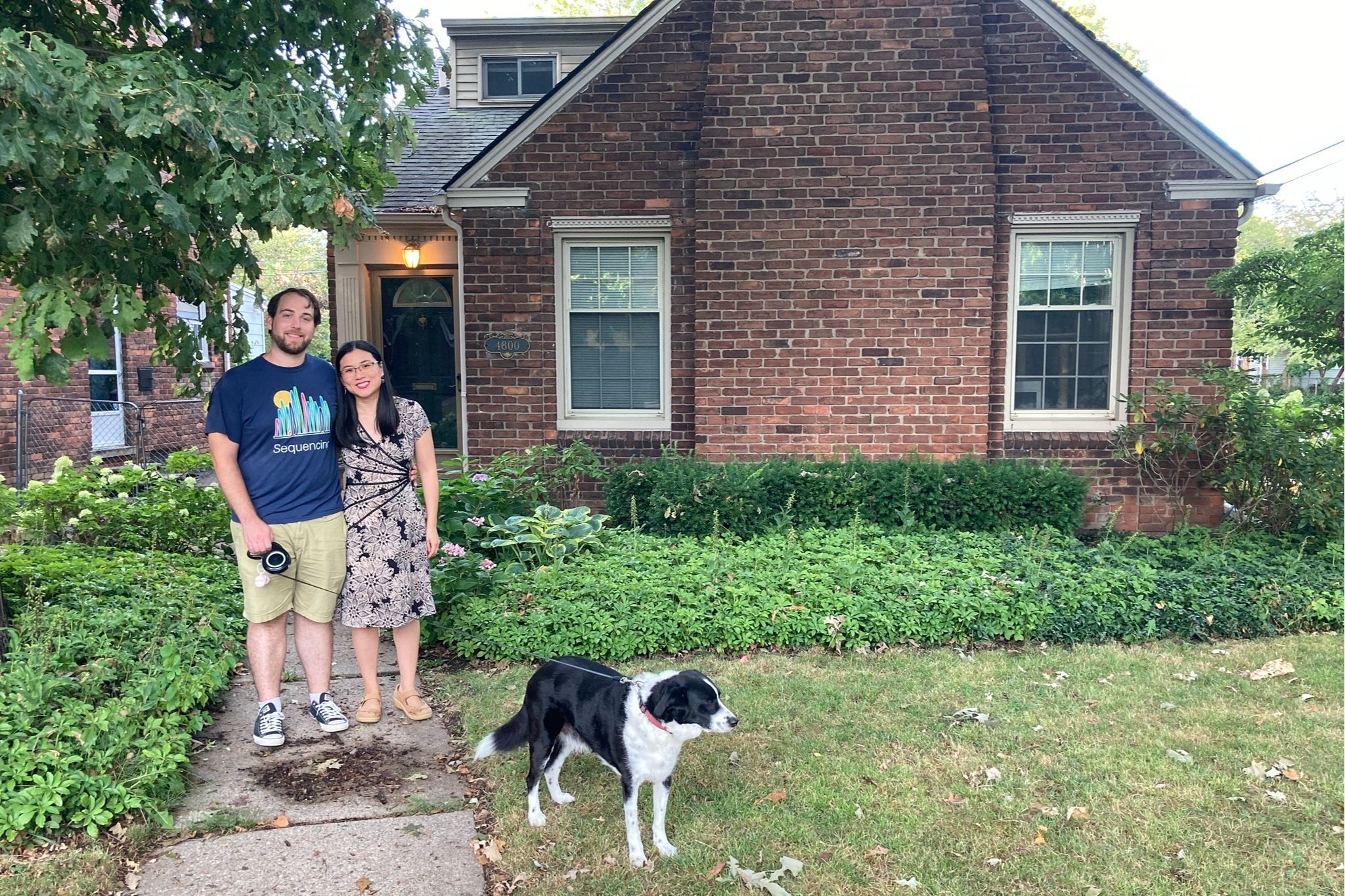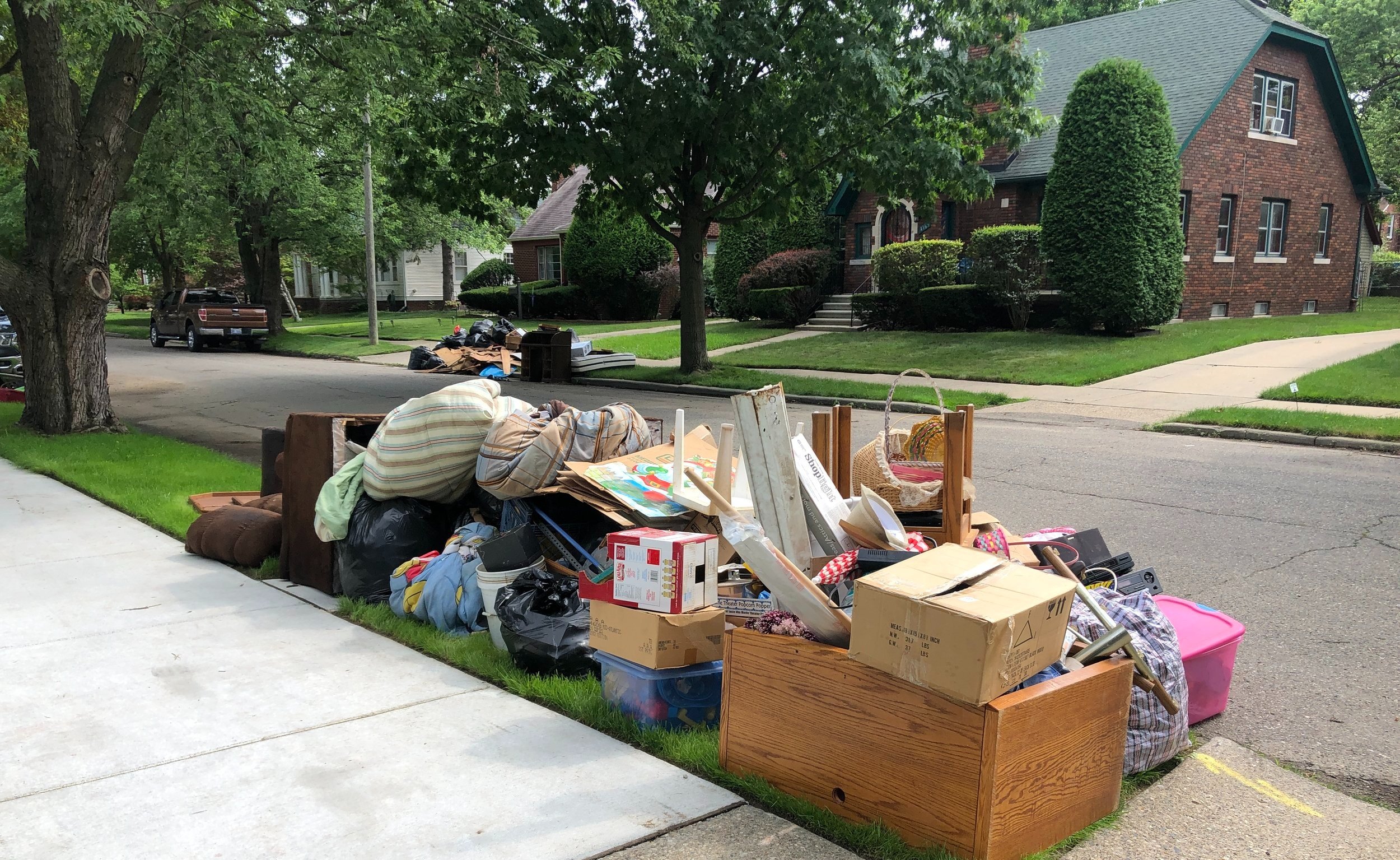They bought their first home. Then came the floods….
Clara and James in front of their Detroit home, 2022.
In 2019, my partner James and I bought our first home, a 1930 brick colonial in East English Village, a neighborhood on the east side of Detroit known for its beautiful architecture and mature trees. We were proud and happy to call it home, until climate disaster struck our community.
On the morning of June 25, 2021, we woke up to texts from our next door neighbor. “Check your basement,” Chris said. “We have four feet of water in ours.” The night before it had rained six inches. I stumbled to the basement, and looking down, saw a black pool of water at the bottom of the stairs, a roll of toilet paper and a cat carrier floating in the water.
We spent the rest of the day fishing our belongings out of the water and putting them out on the curb to be thrown away. We watched our neighbors do the same. By evening our street was a garbage dump with people’s ruined belongings lining the sidewalk from one end of the street to the other. By midnight we were still mopping up buckets of sewer sludge, our basement literally covered in a layer of human waste.
For the rest of the week, I worked from home, without air conditioning or hot water, while waiting for the repair companies to arrive. It took six days for the hot water heater to be replaced, as thousands of homes in the city suffered the same fate as ours. It took three weeks to get our air conditioning unit replaced, while we sweated out the hottest days of the summer.
Belongings left out on the curb after the flood.
Within days, I started to feel symptoms–headaches, lightheadedness, fatigue, sneezing and congestion. I struggled to work or function. I could not go anywhere for relief, as local businesses also suffered, and public places were shut down because of the pandemic. I realized the true devastation of flooding was not just losing the use of one’s basement, washer and dryer, air conditioning or hot water, all of which were inconvenient but not life threatening. The worst impact was the way mold and air contamination drained my body and soul of energy and robbed me of the ability to cope. I had a disaster to recover from on top of my regular work, instead I lay helplessly in bed. The symptoms did not go away until the basement was completely dry.
Two weeks later, just as we had finished cleaning up from the first storm, another rainstorm dumped 6 inches of rain on the city and our communities were flooded again.
Next came the financial disaster. My home insurance did not cover flooding, as that needed to be purchased separately in a rider we didn’t know about. The cost of replacing our air conditioner, hot water heater, furnace, cleaning the basement, and mold remediation fell on us all at once. In addition to essential appliances, people lost irreplaceable possessions–family photo albums, journals, and critical documents. We heard about finished basements with wall to wall carpet and thousands of dollars of furnishings that were completely ruined. We heard about a family who ran a salon out of their basement destroyed by the flood. People lost their vehicles. A friend with ADHD whose basement flooded multiple times fell into a depression. She eventually sold her house and moved away. Our losses were slight compared to theirs.
Our Governor declared a state of emergency. FEMA came to our neighborhoods to get us to apply for emergency assistance. They went knocking door to door. Their inspectors wore gas masks but did not enter people’s homes. People applied, were rejected, applied again, and were rejected again. In the end I received $3000, merely a fraction of what the flood had cost us. Most people I knew received less or nothing.
We learned that not only did our community get a historic amount of rain, but the local pumping station was not operating during the storms, due to staff layoffs during the pandemic. The sewage backed up into our basements then drained when the pumps were working again. Neighboring communities that had properly running pumps during the storm did not experience flooding, even though they received the same amount of rain.
Residents were encouraged to file a claim against the Detroit Water and Sewer Authority and the Great Lakes Water Authority. We sent in photos, spreadsheets, and receipts detailing our losses and expenditures. Years later we have only received letters stating the state is not liable for natural disasters and our communities not owed compensation. A public action lawsuit resulted in the judge ruling in favor of the water authorities.
Some families never recovered from the disaster. We heard about family members who suffered illness and death from mold and contamination. We heard about families without heat the following winter because they could not afford to replace their furnace. We heard about families whose house burned down because they were using space heaters or open fires to heat their homes.
The disasters also brought out the resilience and generosity of Detroiters. My neighbor offered us the use of their shower when I did not have hot water. The neighborhood association president visited families and noted their needs. Church groups organized basement cleanups for seniors and single women. Churches gave people a place to stay when they couldn’t stay in their homes. Businesses organized food drives and donated services. A mutual aid Facebook group, started at the beginning of the pandemic, allowed people to post what they needed and offer help. People with cars that functioned drove those who didn’t have them. I have never known a community so connected and willing to help one another.
Detroit is a city with a 78% Black population. It is among the poorest in the country, with a median income of $20,000 a year. Its government is notorious for being underfunded, corrupt, and ineffective. Its public infrastructure is aged and dangerously in need of repair. Despite the lack of public services, Detroiters pay some of the highest property taxes as well as car and home insurance in the nation.
I used to love the sound of rain at night. Now, every time it rains, anxiety wells up as my body mounts a trauma response. We no longer live in Detroit and our home is rented, but I still have nightmares of my bedroom being flooded, my house and belongings washed away.
Climate justice is racial justice. What happened to my community in Detroit is happening with increasing frequency to communities all over the country, with communities of color hit the hardest. Last year, extreme weather and climate disasters caused a total of $165 billion in damages in the United States. We need our government to take climate justice seriously and transition our economy to 100% renewable energy, and reduce emissions 50% by 2030, net zero by 2050. We need compensation for our losses and damages and climate adaptation for our communities. Americans today and in the future deserve nothing less.
Clara at Lake St. Clair in 2021.
Clara Fang is a writer, climate activist, and founder of Green Tara Consulting, which helps organizations advance diversity, equity, and belonging through research, training, and strategic planning. She currently lives in Germantown, Maryland.



